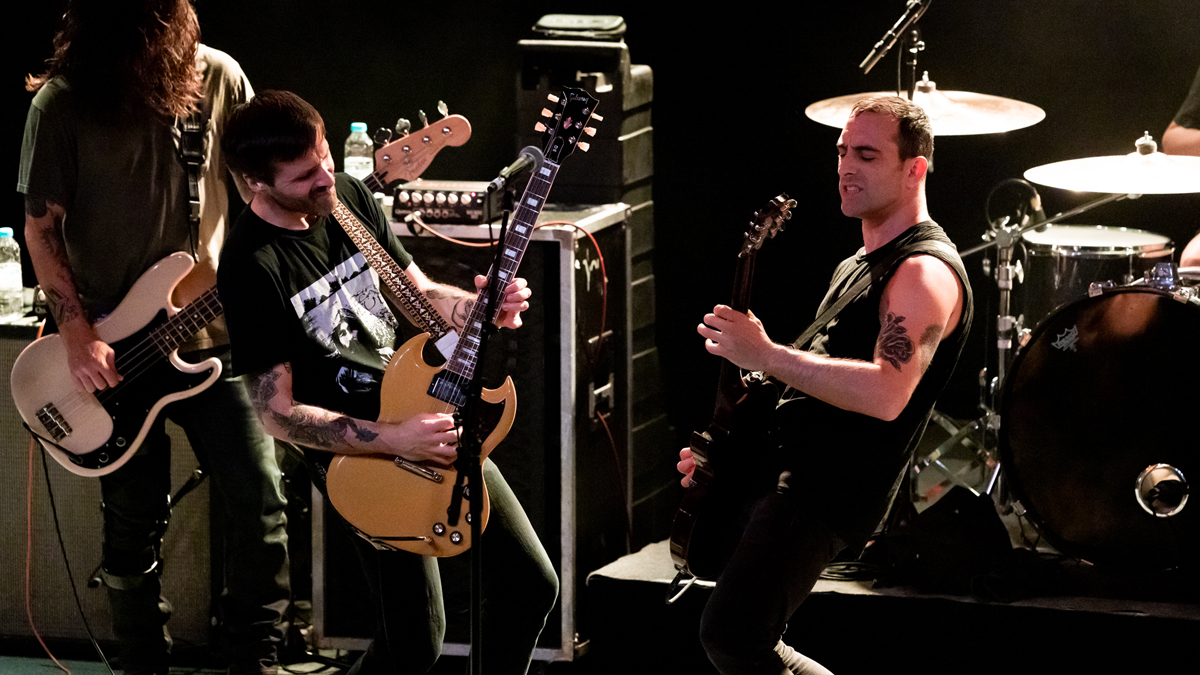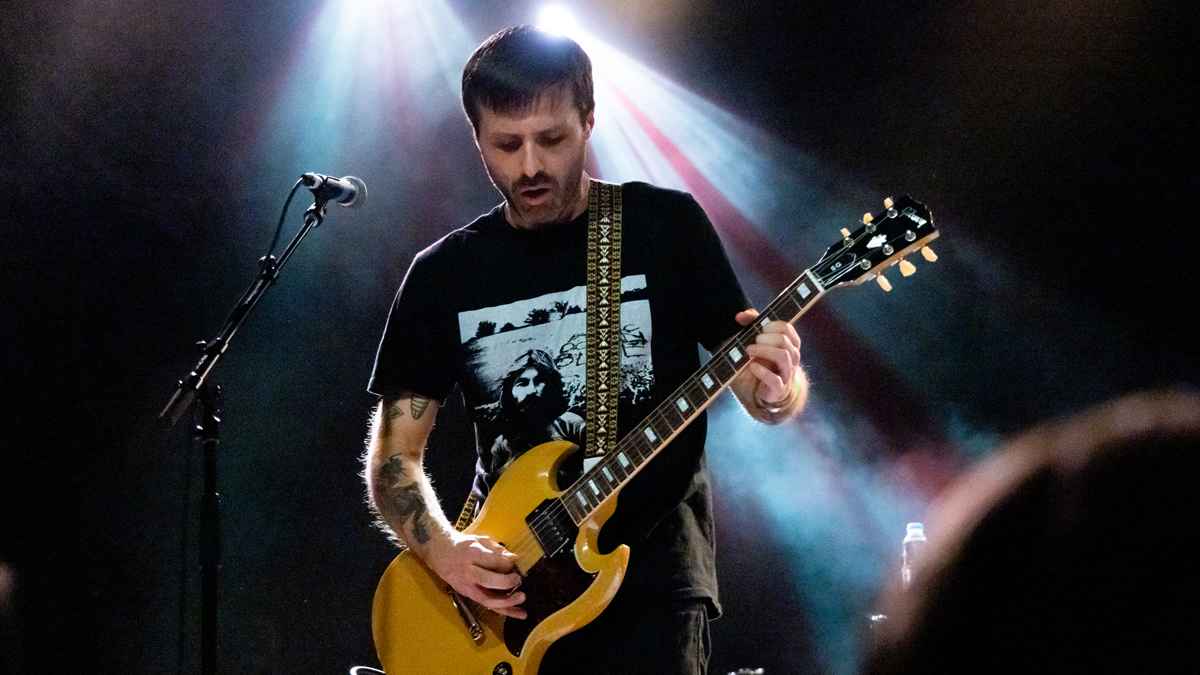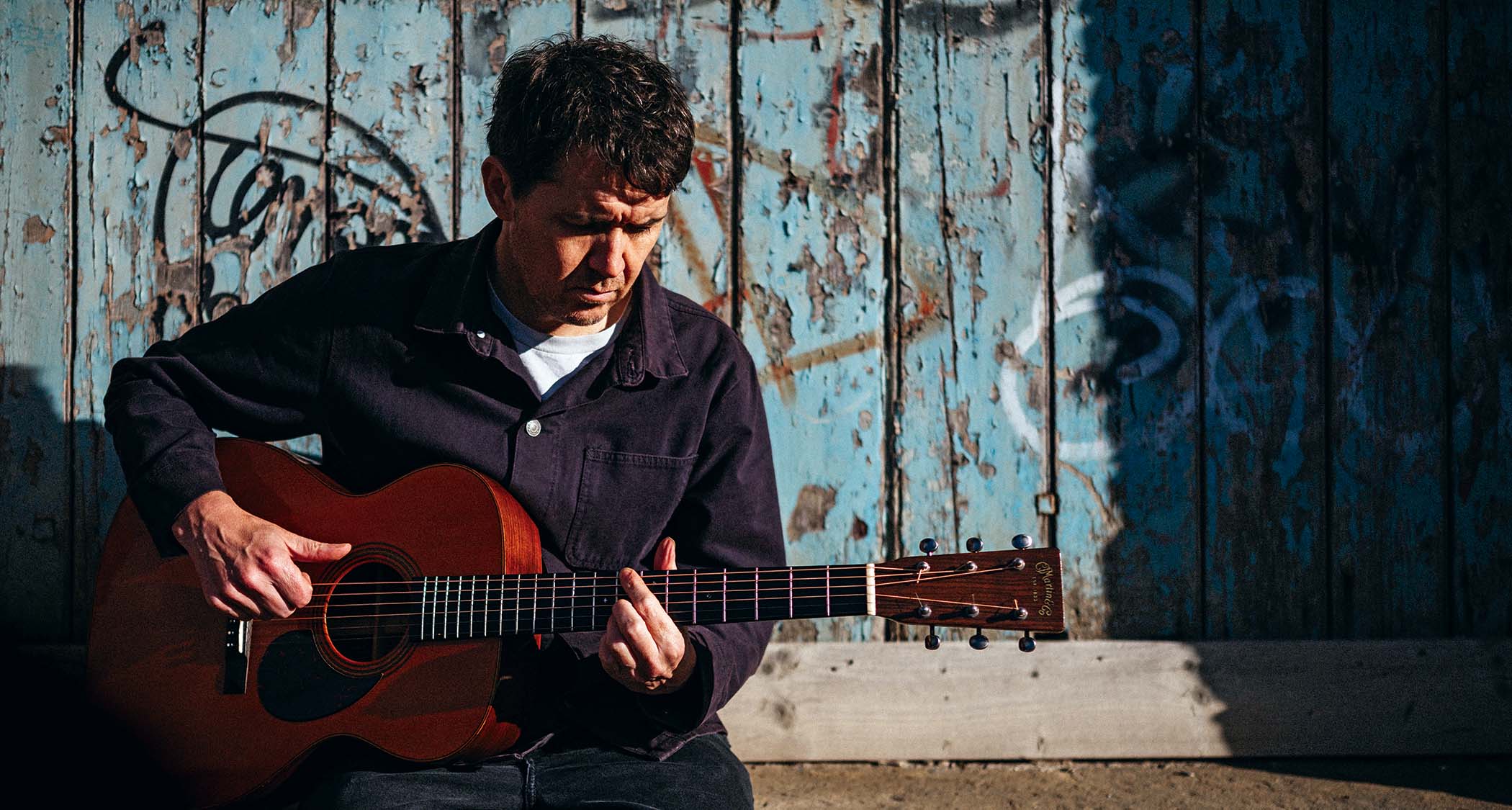Cave In share how recording with Kurt Ballou and building a Covid-safe talk box helped them craft their biggest-sounding album yet
Adam McGrath and Stephen Brodsky discuss the next chapter in Cave In's history, and explore the guitar and studio secrets that helped them honor late bassist Caleb Scofield's legacy on Heavy Pendulum

All the latest guitar news, interviews, lessons, reviews, deals and more, direct to your inbox!
You are now subscribed
Your newsletter sign-up was successful
When Cave In bassist Caleb Scofield passed away in 2018, the influential alt rock outfit’s remaining members – including guitarists Adam McGrath and Stephen Brodsky – reacted to the tragedy with Final Transmission, a raw, cathartic masterwork that contained some of Scofield’s final musical contributions.
However, after eventually releasing the album in 2019 and following it up by playing benefit shows for the Scofield family, it was unclear to the public whether the band had any future beyond that point.
Despite the ensuing mystery, a teasing clue of the band’s future finally came in early 2021, when McGrath mentioned that the band were working with Kurt Ballou – the six-string maestro of hardcore punk outfit Converge – on new material.
Later that year, the band made a series of live appearances with Converge's Nate Newton on bass. At one of these stops, the Decibel Festival in LA, Cave In played their 1998 debut Until Your Heart Stops in full. It felt like the Massachusetts band had found their feet again.
Finally, after some speculation, a new album was announced, Heavy Pendulum, which arrives today (May 20). It's a confident, self-assured record, at times unapologetically triumphant. It marks a new chapter for the band, completing a creative vision originally set by Caleb before his death.
Guitar World got on the phone to guitarists Brodsky and McGrath to discuss their vast pedalboard setups, some surprising studio innovations and what this new chapter has in store for Cave In and their listeners.
At the time of Final Transmission, it seemed uncertain whether Cave In would continue. What was the moment it became clear the band had a future?
All the latest guitar news, interviews, lessons, reviews, deals and more, direct to your inbox!
Adam McGrath: “When Caleb passed away, we knew we had to put the wheels back on the band to put those benefit [shows] together to raise as much money as we could for the Scofield family.
“In that process, we had Nate join the band, and it seemed stupid to throw it all away after just doing a few benefits. It seemed like we should seek out what the band dynamic would be like with Nate. Also, doing the band after Caleb passed away was very healing for us. I think moving forward it was such a healing process, the four of us being together.”
Stephen Brodsky: “We were in a unique position where we had done a bunch of touring prior to writing this record. In our touring, we put together a set that we thought was going to be sort of 'the best of Cave In', in terms of presenting that to a crowd of people, and also a set that was interesting for ourselves to play.
“So we were curators of our own catalog, in a sense, just before getting into writing a record. I think re-acquainting ourselves with the best of the band put us in a good position to start writing new music.”
What was the writing process like? When did it start?
McGrath: “We all got locked up during the pandemic, and like Steve says, it was a perfect storm. Cave In had just got done doing all the touring for Final Transmission. We were in a state where if the pandemic didn't happen, we'd be writing anyway, but the pandemic happened, [and] we got locked down for a while.
“Steve started writing and circulating demos within the group, and that's how we started figuring out how we should get together and move forward with making a new Cave In record.”
Heavy Pendulum is what Cave In has been trying to do our entire career. We pulled it off this time
Adam McGrath
What would you say is different about this album?
McGrath: “For me, and I'm just speaking for myself, when I hear this new record, I feel like this is what Cave In has been trying to do our entire career. We pulled it off this time. With this record, when we were done with it, I looked back and went, 'I think we achieved our vision.'”
And what was that vision, in the case of Heavy Pendulum? Was it clearly defined, or quite nebulous?
McGrath: “For me, I just knew if Cave In were going to do another record without Caleb Scofield then it had to be amazing. I'm so proud of all the work we did with Caleb, but moving forward I knew it had to be a statement, and I knew we had to achieve a goal that Caleb left us with, before he passed.
Caleb Scofield really set us on this path of, 'We need to focus on the best parts of our band that set us apart from our peers'
Adam McGrath
“White Silence was recorded in our practice space, you know? He really set us on this path of, 'We need to focus on the best parts of our band that set us apart from our peers,' and get our band back into the studio to make a proper studio recording.”
What is it that sets Cave In apart from their peers?
Brodsky: “That's a great question. Knowing our strengths and weaknesses is something that we've always tried to stay in touch with. As early as touring for the Until Your Heart Stops record back in '98 to '99, we knew that as far as pushing our technical abilities in the realm of metal/hardcore, we didn't really have the fire or the passion to go above and beyond what we had achieved with Until Your Heart Stops.
“It had something to do with seeing bands like Coalesce, Dillinger Escape Plan, Botch and Meshuggah doing these amazing things in that realm. We thought that we could throw a curveball into the mix of our creative process and keep the same intensity, but just dress it in a different way sonically, and alter the presentation a little bit.”

Was there anything else that pushed you in a new direction during that time?
Brodsky: “Touring with Neurosis opened our eyes a little to what was possible. So, as far as writing melodic hooks, vocal hooks, spacey sort of high-end crystallized sonic palettes and frequencies, we felt like if we really laid into that end of things, it would really put us in our own world. I don't think we've lost sight of that in the last 20 years.
“Our focus has definitely shifted, but I think keeping that in mind has been a constant for Cave In. Like Adam said, with Caleb having this mission statement for wanting to do something creative with the band towards the end of his life, he touched upon these things as well, and it was reinforcing to hear him keeping in touch with that element of the band. Moving forward, it's certainly something we tried to do to the best of our abilities with Heavy Pendulum.”
An immediate reaction would be that it's very different, as you've both touched on, because of the production.
McGrath: “White Silence and Final Transmission are practice space recordings. Kurt Ballou [worked] on the new record, and he knows what he's doing. Even when we were making the new record, I said many times, 'Man, I haven't heard Cave In sound like this in a long time.'”
We've seen it compared to Jupiter, but there's the question of whether that's because of the riffs or the production.
McGrath: “I think there's certainly Jupiter stuff on it, but you can hear every record we've done, I think. I really feel like it's like everything we've ever done, but better executed.”
Despite taking cues from the whole of Cave In's discography, it's a very consistent listen.
Brodsky: “Yeah, the consistency was very important to me, because I thought it was going to encompass a highly concentrated effort by the band, which we hadn't had in a long time. Most of the material [was] written in a very specific period.
“Sonically, recording virtually everything with Kurt at God City certainly helped with that. I think that all those things lent themselves to making a very tight, focused statement.”
In terms of guitars and gear, was there anything new for this record?
Brodsky: “On the Final Transmission tour, we had a stop in Toronto. We went into this awesome store that was clustered with cool, old, vintage gear, and Nate pulled an Aria Les Paul off the wall. It was so cheap in terms of the price, and probably what it's worth in terms of its playability and its overall vibe.
I rarely ever buy gear on the road unless I absolutely have to. But this Aria Les Paul became a weapon of Cave In sonic wizardry
Stephen Brodsky
“I rarely ever buy gear on the road unless I absolutely have to. But something came over me and I grabbed that guitar, [and] played it on the rest of the tour. I never had it set up, I don't even know if I changed the strings after buying it. It went right into the set, you know?
“That guitar kind of became this cool little weapon of Cave In sonic wizardry. I played it on pretty much all the live tracked stuff at God City. It was this new piece of gear. Here's Cave In with a new line-up and a new record, and it had everything to do with wanting things to just feel fresh.”

Adam, you first used a Fender on Final Transmission – did that continue?
McGrath: “I purchased a Jazzmaster with the money I made from the last show I ever played with Caleb Scofield, that's how I think of it. I used it on Final Transmission, and I used it on some of the writing for the new record. I basically go between my Jazzmaster, and new [Gibson] SG – it's one of those Easter Egg Yellow Chicago Music [Exchange] ones, which I got about two years ago.”
What pickup configuration is that?
Having one guy use a Gibson, and one guy use a Fender, that's a pretty awesome sound in a dual-guitar band
Adam McGrath
McGrath: “Standard, with two humbuckers. I've also got a Root Beer Gibson Les Paul Studio, and those are the three guitars I rotate. It's been fun, because I was strictly Gibson for years, and it's fun to splice in a Jazzmaster or a Strat every now and then. It really is a different trip, and as much as I am a Gibson guy, I really think you get more for your money with the Fender.”
What kind of pickups are in the Jazzmaster?
McGrath: “It's a Jazzmaster with P-90s, very Dinosaur Jr-esque. It sounds awesome – it really has its own tone. On the song Heavy Pendulum, I used the Jazzmaster. It's very crunchy, and Steve and I have talked about this... having one guy use a Gibson, and one guy use a Fender, that's a pretty awesome sound in a dual-guitar band.”
What pedals were used on the new album? Was it business as usual or were there new toys?
Brodsky: “I went to the studio with my go-to electronic goodies for Cave In, knowing that Kurt would have a treasure trove of stuff to try out. From what I remember of his collection, the clean tone in the title track was done on Kurt's Tele, using either a Demedash Videotape Echo or a Strymon delay/reverb. You can also hear a Triplegraph pedal making an octave effect on the lead guitar in Floating Skulls, when the opening riff returns after the first chorus.
“Otherwise, I changed it up a little with my lead tone for this album, using my EarthQuaker Pitch Bay dialed in for maximum Chuck Shuldiner effect. It's most noticeable in Blinded, the title track, Careless, [and] Amaranthine. The wah effect at the beginning of Waiting For Love is a DOD Envelope Filter, one of the first pedals I ever owned.
“And one of the more interesting moments while making the album happened in New Reality. I had this idea for a talk box effect in the bridge, and since it was the height of Covid times, we assumed that using an actual talk box probably wasn't safe, so we built our own. Using playback of the guitar track through a tiny Danelectro amp with some plastic tubing, we did something cool that you can see in action on the God City Instagram.”
McGrath: “My standard pedalboard set up is the Boss Chorus Ensemble, Boss Tremolo, Boss PS-2 Pitch Shifter Delay, Boss Harmonist, MXR Phaser, Boss Space Echo, Boss OS-2 Overdrive Distortion and Electro Harmonix Holy Grail reverb. I used a Mr Black Eterna pedal for the long sustaining reverb leads in Reckoning, plugged into one of Kurt's GCI guitars.
“For the more ripping standard leads [on] Floating Skulls and Wavering Angel, I used one of those very expensive and sought-after Klon Centaur pedals. I knew Billy Gibbons was a fan of this pedal so I had to try it!”
Talk to us about amps. For Final Transmission you were running a Sunn and some Marshalls – was that the same this time?
McGrath: “We re-amped everything, and Kurt had a set up of what he wanted to go through. I know he has a JCM800 and this purple amp [a custom Sparrows’ Sons head, from Belarus]. He also has some Traynors that sound amazing.”
Brodsky: “We got a great clean tone from one of his Traynor amps. That's the clean tone for the title track, at the very beginning of the song. Kurt also has this amp that was built by, I believe, a Chicago-based amp maker. In the shootout for the re-amping we went through several amp and cab configurations to figure out the sound I wanted, and once we got to this particular amp, it was a no-brainer. Wherever I was standing in the control room, this thing leaped at me.”
What's your plan for live? Some of that gear is pretty rare.
Brodsky: “As far as rehearsals and live shows, Adam and I have really taken to Quilter amps. We're embracing the solid-state, which we're totally cool with. You turn those things on and you're basically going to get the same sound from the moment the amp gets switched on, to the amp turning off.”

Taking it back to the album, there's a strong sonic consistency to the instrumental parts on Heavy Pendulum. Does that extend to the lyrical themes?
Brodsky: “Lyrically, I wanted to do things with this record that I always wanted to do in the past, but I felt like I had the songwriting maturity and experience to pull it off now. I tried to make each line read like a book, you know? Each line could be the start of a story. I wanted the lyrics to read in a way that you could take up to two or three different perspectives on what was being said.
“That was actually something that the other guys were very helpful with. It came down to me being very open about what I was trying to say with each song and having these guys weigh in on their thoughts on what was being said. Sometimes, hearing back what they thought I might be saying was more interesting than what I was actually saying.”
In what way?
Brodsky: “So, it could be a word or a phrase that these guys might hear. Whether it was in their minds, or what they wanted me to be saying, that ended up transforming things. That happened with music too, with Adam and I showing each other riffs, or Nate showing us stuff, or the three of us showing each other ideas.
“Much like how light is constantly distorted as it reflects off surfaces, I think sound is the same. Sometimes those distortions of an idea being reflected back, [are] more interesting than the original conception of that idea. Those are some of my favorite moments on the album.”
- Heavy Pendulum is available to order now via Relapse Records.
Alex Lynham is a gear obsessive who's been collecting and building modern and vintage equipment since he got his first Saturday job. Besides reviewing countless pedals for Total Guitar, he's written guides on how to build your first pedal, how to build a tube amp from a kit, and briefly went viral when he released a glitch delay pedal, the Atom Smasher.

